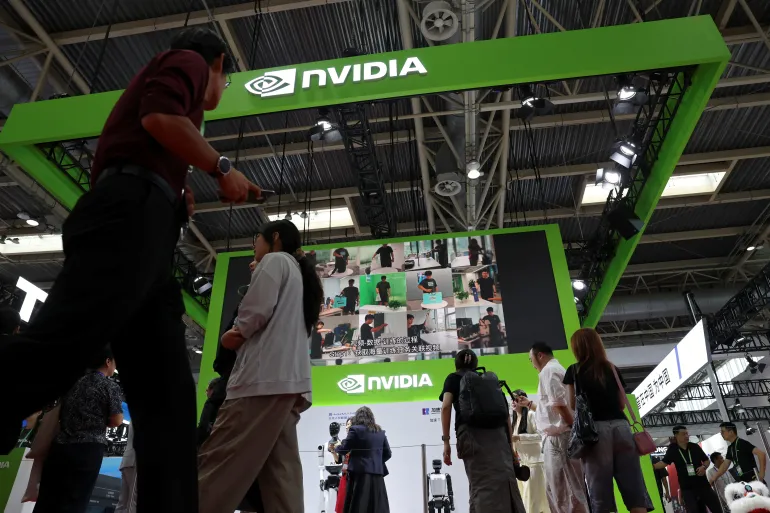
The AI chipmaker’s valuation soars past $5 trillion, cementing its dominance in artificial intelligence and reshaping global tech markets.
In a landmark moment for the global technology industry, Nvidia has become the first company in history to surpass a $5 trillion market valuation, just three months after it crossed the $4 trillion threshold. The AI chip giant’s stock surged more than 5 percent in early New York trading, reflecting investor confidence in its leadership of the artificial intelligence (AI) revolution.
The rapid rise underscores Nvidia’s transformation from a niche graphics processing unit (GPU) designer into the central force driving today’s AI-driven economy, with its powerful chips now essential for machine learning, autonomous systems, and data centers worldwide.
Nvidia’s $5 Trillion Milestone and the AI Market Boom
The milestone highlights the unprecedented pace of Nvidia’s growth. Since the public release of ChatGPT in 2022, Nvidia’s stock has skyrocketed more than twelvefold, helping propel the S&P 500 to record highs. The company’s H100 and Blackwell processors have become the backbone of large language models (LLMs) and AI tools used by tech leaders like OpenAI, Elon Musk’s xAI, and Google DeepMind.
At its current valuation, Nvidia is now worth more than the entire cryptocurrency market and nearly half the value of Europe’s Stoxx 600 index.
“Nvidia hitting a $5 trillion market cap is more than a milestone — it’s a statement,” said Matt Britzman, senior equity analyst at Hargreaves Lansdown. “It has evolved from chipmaker to industry creator, and the market still underestimates the scale of the AI opportunity.”
AI Investment, Chip Orders, and Supercomputers
During Nvidia’s latest developer conference, CEO Jensen Huang revealed $500 billion in new AI chip orders and plans to build seven U.S. government supercomputers, deepening the company’s strategic partnership with Washington. The announcement further solidified Nvidia’s role as a national tech asset amid rising geopolitical competition over AI dominance.
At current prices, Huang’s personal stake in Nvidia is valued at roughly $179.2 billion, making him the eighth-richest person in the world, according to Forbes. Born in Taiwan and raised in the United States from age nine, Huang co-founded Nvidia in 1993 and has been its visionary leader ever since.
U.S.–China Tensions and Global Regulatory Scrutiny
Nvidia’s rise has also drawn the attention of regulators and governments worldwide. Its cutting-edge AI chips, particularly the Blackwell architecture, have become a flashpoint in U.S.–China trade tensions. Washington’s export controls on high-end semiconductors have restricted Nvidia’s ability to sell its most advanced processors to Chinese firms, a move aimed at limiting Beijing’s access to frontier AI technology.
President Donald Trump is expected to raise the issue directly with Chinese President Xi Jinping during their upcoming meeting at the APEC Summit, with Nvidia’s products likely to feature prominently in the discussions.
“Nvidia clearly brought their story to Washington to both educate and align with U.S. policy,” said Bob O’Donnell, founder of TECHnalysis Research. “They’ve positioned themselves at the intersection of technology, economics, and geopolitics.”
Still, Huang has warned against a full decoupling between the world’s two largest economies, noting that excluding China could mean losing access to half the world’s AI developer base.
Wall Street Reaction and Market Outlook
As of 10:45 AM in New York (14:45 GMT), Nvidia’s shares were trading up 5.1 percent, continuing a year-long rally that has made it the world’s most valuable publicly traded company. Competitors such as Apple and Microsoft, each hovering around $4 trillion valuations, trail behind as investors pour capital into the AI ecosystem.
Despite growing enthusiasm, analysts have raised concerns over potentially frothy valuations.
“AI’s expansion depends on a few dominant players financing each other’s capacity,” said Matthew Tuttle, CEO of Tuttle Capital Management. “If investors start demanding profits instead of production, these flywheels could seize up quickly.”
Nvidia is set to report its next quarterly earnings on November 19, a highly anticipated event expected to offer deeper insights into AI infrastructure demand, global chip supply, and profit margins.
Nvidia’s Role in the Global AI Revolution
Under Jensen Huang’s leadership, Nvidia has positioned itself as the architect of the AI era. Its GPUs have become indispensable for training and running AI models, powering data centers, self-driving vehicles, and quantum computing experiments.
By investing heavily in software ecosystems, developer tools, and supercomputing facilities, Nvidia has turned its chips into platforms — not just products. Analysts say this integrated strategy gives the company a near-monopoly position in high-end AI hardware.
“Nvidia’s dominance is built on innovation and timing,” said Britzman. “As AI spending accelerates across cloud, healthcare, and defense sectors, Nvidia remains the defining winner of this technological shift.”
The Future: AI, Competition, and Regulation
Rivals such as Advanced Micro Devices (AMD), Intel, and several AI chip startups are racing to challenge Nvidia’s dominance. Yet, industry observers agree that no competitor currently matches Nvidia’s combination of hardware, software, and developer adoption.
Meanwhile, global regulators are likely to intensify scrutiny as Nvidia’s market power expands. In Washington, Brussels, and Beijing, policymakers are weighing how to balance AI innovation with national security and market fairness.
For now, though, Nvidia stands alone — the undisputed king of the AI era, leading a trillion-dollar transformation that is redefining global technology and economics alike.


Leave a Reply